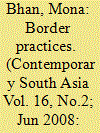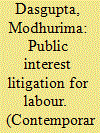| Srl | Item |
| 1 |
ID:
082505


|
|
|
|
|
| Publication |
2008.
|
| Summary/Abstract |
Scholarly writings on Kashmir have primarily discussed state-centred initiatives that are aimed at fostering nationalism among border communities. In this paper, I use the example of Brogpas-a border community living on the contested line-of-control between India and Pakistan-to argue that national identity for Brogpas is the product of fostering their national boundaries through their everyday labour practices. A focus on khral (mandatory labour) among Brogpas illuminates how national identities are constituted in the peripheries rather than being 'imposed and built from the centre outward'.1 Khral also underscores the centrality of border practices in creating and maintaining national consciousness.2 The customary practice of khral demonstrates that citizenship to the village and the Indian nation-state are not construed as distinct processes by Brogpas. Brogpas establish and/or maintain their allegiance to a particular village by doing khral that among other things includes working for the Indian army as porters. An attention to khral highlights how national identity is instantiated among Brogpas though everyday practices of working for the Indian border rather than through mere symbolic constructions of an imagined community.
|
|
|
|
|
|
|
|
|
|
|
|
|
|
|
|
| 2 |
ID:
082508


|
|
|
|
|
| Publication |
2008.
|
| Summary/Abstract |
The lines between terrorism and brutal profiteering are increasingly blurred. Terrorists engaging in criminal acts under the guise of ideology pose a real and pervasive threat to international security. Through loss of leadership, a changing historical moment or the sheer lure of fistfuls of cash, politics and ideology bow to commerce, becoming nothing more than attractive faades that can pave the way to recruitment and cooperation with other, more-principled organizations. When it comes down to it, these types of terrorists need to be treated as criminals motivated by money, not ideals
|
|
|
|
|
|
|
|
|
|
|
|
|
|
|
|
| 3 |
ID:
082507


|
|
|
|
|
| Publication |
2008.
|
| Summary/Abstract |
This article presents the results of a field study undertaken in the province of Balochistan, Pakistan, to understand the experience and impact of an ongoing programme of transitioning from karez (an ancient mode of tapping groundwater) to tubewell irrigation on social equity, livelihoods, community cohesion and environmental quality. The article explores how changes in water management techniques and technologies are influenced by and, in turn, impact social power relations at various scales. Analyses of the field study results and policy context of groundwater management in Balochistan reveals that the transition from karez to tubewell irrigation was neither inevitable nor necessarily more advantageous but, rather, the outcome of deliberate policy choices by the government. The diffusion of tubewells is putting traditional communal modes of power in communities under stress and, in places, replacing them with the power of large farmers. At the policy level, the differential power of the discourse of modernization, coupled with the compensatory power of large farmers, is facilitating the rapid diffusion of tubewells in Balochistan. The transition from karez to tubewell irrigation also is having negative consequences for social equity and environmental quality. The article concludes by proposing specific policy initiatives that may help save and rehabilitate the rapidly dwindling karez irrigation in Balochistan
|
|
|
|
|
|
|
|
|
|
|
|
|
|
|
|
| 4 |
ID:
082506


|
|
|
|
|
| Publication |
2008.
|
| Summary/Abstract |
This paper argues that a distinctive form of public interest litigation has been used effectively in the Indian Supreme Court to protect the rights of exploited workers. By looking at the extreme cases of child labour and bonded labour, this study finds that the Indian Supreme Court has been labour-friendly, and has taken seriously the constitutional promise of socio-economic development. In rulings that enlist the aid of local governments and non-governmental organizations, the higher judiciary has helped to make positive changes for the most disadvantaged workers in Indian society. This paper results from a year of fieldwork in New Delhi, and relies on case rulings, archival work, and ethnographic field research
|
|
|
|
|
|
|
|
|
|
|
|
|
|
|
|